
Managing multiple bank accounts provides greater financial control and flexibility, replacing traditional single accounts with diversified holdings across institutions.
The strategy of managing more than one bank account has gained traction as a powerful tool for individuals searching for more monetary control and versatility. Gone are the days of a single financial savings and chequing account.
Today, savvy money managers are exploring the advantages of diversifying their financial holdings across multiple banking establishments.
Traditionally, individuals operated with a single bank account into which their earnings were deposited, bills were paid, and savings were stored. However, as monetary landscapes evolve, so do the strategies for dealing with one's cash. The contemporary method entails diversification– spreading funds across diverse accounts to optimise advantages and mitigate risks.
The power of diversification
One of the primary advantages of having multiple bank accounts lies in the ability to diversify monetary assets. Different banks provide diverse perks such as better interest rates, lower charges, or specific rewards programmes. By strategically allocating budgets among multiple accounts, individuals can maximise these benefits and minimise the impact of any single financial institution's policies or modifications.
Maintaining multiple bank accounts can also streamline budgeting and financial institutions. By designating specific accounts for unique purposes – including one for daily fees, another for emergency savings, and another for long-time goals – individuals can establish a more structured and disciplined approach to managing their finances. This segmentation simplifies monitoring expenses, tracking savings progress, and ensuring that finances are allocated where they're needed most.
Another compelling purpose to consider multiple bank accounts is enhanced monetary protection. In the event of unexpected situations, having funds spread across different institutions offers a layer of safety. Whether it’s a banking issue, a compromised account, or a monetary downturn affecting one bank, diversification ensures that not all financial assets are at risk simultaneously.
Optimising interest and rewards
Different banks provide varying interest rates on savings accounts and specific reward programmes on credit cards. By strategically selecting accounts based on these factors, individuals can capitalise on opportunities to earn more from savings and benefit from different rewards. This approach requires some research, but the potential financial gains make it a profitable endeavour.
Effective management is key to reaping these advantages. Here are some sensible tips to navigate this monetary strategy.
Establish clear goals: Define the purpose of each account to align with monetary objectives
Regularly review and reevaluate: Stay informed about changes in fees, interest rates, and policies to ensure that accounts are optimised to meet their goals.
Utilise technology: Leverage online banking tools and apps to monitor and manage accounts easily
Automate transfers: Set up automated transfers to simplify the process of allocating funds to different accounts
The concept of maintaining more than one bank account emerges as a strategic and empowering approach. By diversifying financial holdings, individuals can unlock several advantages, from improved safety and optimised interest to enhanced budgeting and organisation. As individuals embark on their financial journey, they should consider their precise goals and discover the possibilities that multiple bank accounts offer in building a more resilient and wealthy financial future.